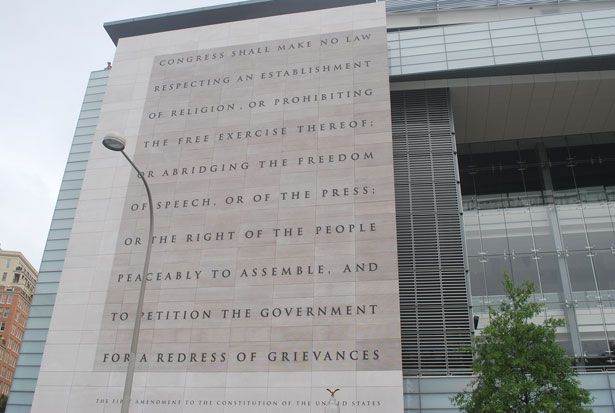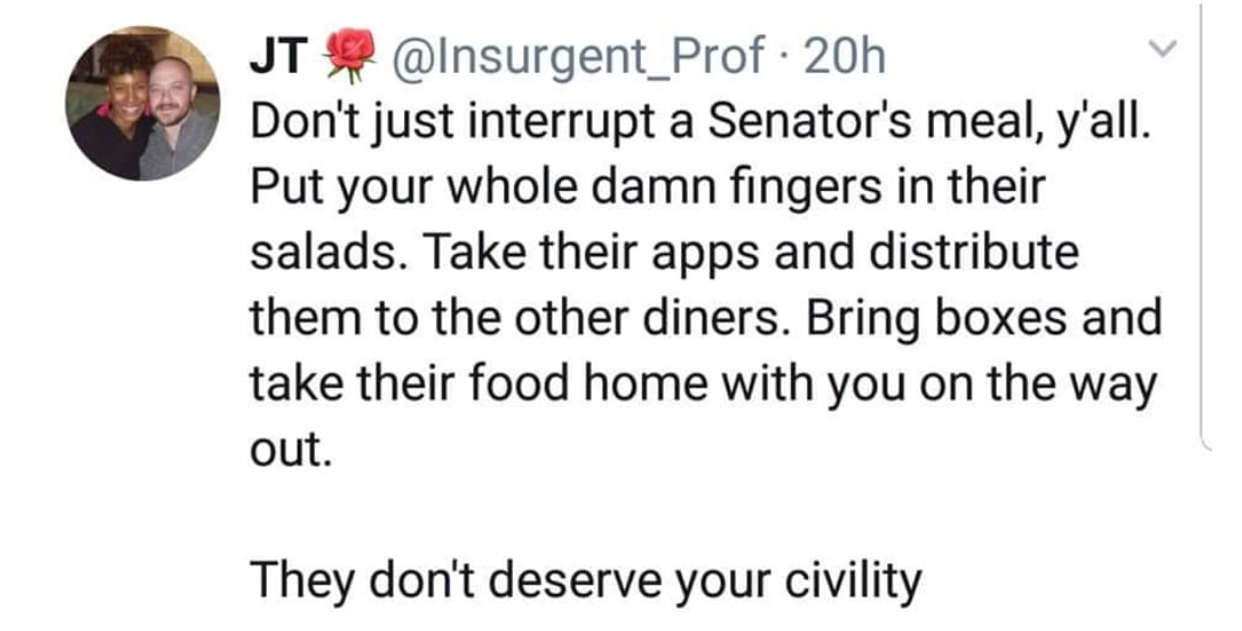Featured
Freedom of Speech: How a Professor’s Words Affected Tenure Process
By Talbert Toole
Lifestyles Editor
talbert.toole@hottytoddy.com

The wall of Newseum—an interactive museum that promotes free expression and the First Amendment to the United States Constitution. Photo via publicdomainpictures.net
While the First Amendment protects citizens’ right to freedom of speech, recently there has been local controversy as to whether or not it covers protected speech and academic freedom.
University of Mississippi sociology assistant professor J.T. Thomas was granted tenure at the university Thursday, May 16. However, as soon as the news broke, a social media post he made in October 2018 resurfaced. Since the announcement, Thomas has yet again faced scrutiny, except this time, those on both sides of the political aisle have engaged in disagreements regarding the freedom of speech, especially its relevance to protected speech and academic freedom.
The Mississippi Institutions of Higher Learning was under fire after they held a two-hour-long executive session meeting allegedly regarding whether or not to tenure Thomas. The IHL said in a statement that “the reason they removed his name from the list and decided to have a personal session regarding Thomas’ tenure was due to social media comments he made in October 2018.”
Thomas said the precedent the IHL is setting is one in which they can use the cover of “executive session” to meet behind closed doors and play politics with the process of academic review, where consideration of one’s politics has no place.
“I was singled out because I made political statements that some members did not agree with,” Thomas said.
Academic Freedom is the concept based on the idea that the free exchange of ideas on campus is essential to education, according to the American Federation of Teachers (AFT).
The AFT states that “academic freedom is the right of faculty members, acting both as individuals and as a collective, to determine without outside interference: the college curriculum; course content; teaching; student evaluation; and the conduct of scholarly inquiry.”
Thomas said politics should not play a part in the tenure and review process, as it seems it did during his review process.
“That’s dangerous and chilling to free speech and academic freedom across the entire public higher education system of Mississippi,” he said.
Recently, many who oppose Thomas’ comments have taken to social media platforms to express disagreement with the IHL decision, such as Michael Watson, a state senator for the 51st district of Mississippi and currently running for Sec. of State, responded to the news of Thomas’ tenure on Twitter the day of the announcement, May 16.
On May 18, Thomas and Watson exchanged differences via Twitter. Watson stated that Thomas had crossed a line in Oct. 2018 insinuating that the assistant professor was inticing violence against politicians. However, Thomas told Hottytoddy.com that his social media post was in regard to the Brett Kavanaugh hearings, along with the U.S. government separating immigrant children from their parents, or as Thomas called them “operating concentration camps.”
Watson argued that Thomas’ statement was not considered protected speech—freedoms covered and protected by the First Amendment.
According to a report Congressional Research Service, “Freedom of Speech and Press: Exceptions to the First Amendment,” the Supreme Court ruled in what it considers to be unprotected speech: obscenity, child pornography, and speech that constitutes so-called “fighting words” or “true threats.”
Those who took to social media in opposition of Thomas, such as Watson, said his statement falls under unprotected speech and should not have received tenure. Many even stated he should have been terminated. Thomas said those in opposition calling for his termination for what he said either do not understand what was said, the context in which it was said, or the relationship between what he said and his role as a professor and academic, or some combination of those.
“For others, I think it’s far more simple: they are looking to silence those of us who speak out against injustice because injustice serves their interests,” he said.
Viral Social Media Posts
In the 2018-19 academic year, there have been two social media posts that have both received scrutiny: Thomas’ Oct. 2018 post and Ed Meek’s Sept. 2018 post.
Meek, the former namesake of the School of Journalism, made a statement, now deleted, on Facebook in September 2018 criticizing activities late into the night on Oxford’s Historic Square. Accompanying the statement were two pictures with two African American females who attended the University of Mississippi at the time.
The post was highly criticized and even garnered national attention.
Many of the LOU community members defended Meek and his right for freedom of speech, and later questioned why Meek faced consequences and Thomas did not.
“People making comparisons between the substance of my comments and Meek’s are equivocating,” Thomas said. “Beyond the substance of our comments, there is the context.”
Both Meek and Thomas are private citizens free to post things to social media platforms, such as Facebook, but neither is free from consequences for their speech, Thomas said.
“However, my speech was political in nature, on a matter of public concern, and critical of my elected officials,” Thomas said. “As a public employee, I do not give up my right to criticize my government when I work for the government.”
Hottytoddy.com reached out to both University of Mississippi officials and Sen. Watson for comment, but neither responded to inquiries.

































Rudy Koski
May 23, 2019 at 2:36 pm
I agree with the professor that his comment was political – but he is wrong that he was not encouraging a physical encounter with people he does not agree with. That is shameful and is an example of a person who should never lead a classroom
Dianne Webb
May 23, 2019 at 4:01 pm
I also take issue with Thomas’s statement that he was not encouraging a physical encounter. The act of putting fingers in another’s food or stealing another’s food is asking, no begging, for an encounter. Thomas knows that young adults are fertile ground for sowing discord. Look at the name he chose: Insurgent_Prof. Do any of us really believe that he was not encouraging a physical encounter? Let us just suppose that his words had influenced a young person to disrupt a lawmaker’s meal and in the course of doing so, someone was hurt (tripped, fell, hit). Who would have been held responsible? Thomas, in my opinion, would have been culpable.
Dawn Copley
May 24, 2019 at 10:20 am
Ed Meek is an excellent and outstanding man of our community! He was writing as a man concerned for our community. We live here permanently. We want our city safe. It is a shame that fighting in the streets unsupervised late at night and young women walking around as though they have been attacked or harassed walk around aimlessly unprotected are seen with desperate looks on their faces any time of night. There is obviously a lack of direction for our youth as seen here. I think this was the point of Mr. Meek’s post. Sometimes a picture speaks more than a thousand words. I agree we need to face some of the things that our citizens have not been voicing in public. That is point of view for some. Discuss point of view of others. Solve a problem. Take the opportunity to speak out and correct issues better for all parties involved. Do not ever just shut a door from communicating. Communication is what makes us human beings and uniquely able to act with civility and justice. Just do it! Don’t just hide things and shut out ideas that may forward civility! Thank you Ed Meek!
Loretta
May 24, 2019 at 12:36 pm
Ole Miss needs many, many more professors such as Professor Thomas.
Professor Thomas is a brilliant beacon of truth and courage.